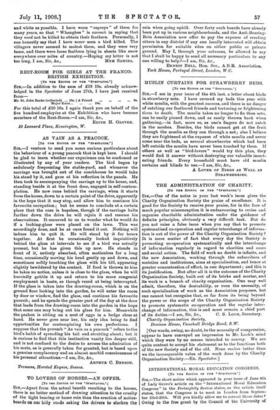THE ADMINISTRATION OF CHARITY.
(TO TUB EDITOR 011 TUB 'SPECTATOR." j SIR,—One of the notes in your last week's issue gives the Charity Organisation Society the praise of excellence. It is good for the Society to receive your praise, for in the face of much popular misconception it is endeavouring to revise and organise charitable administration under the guidance of definite principles, obviously a very difficult task. But do you not raise a false issue when you say that to promote systematised co-operation and regular interchange of informa- tion is out of the power of the Charity Organisation Society ? It is mere matter of fact that every day the Society is promoting co-operation systematically and the interchange of information regularly in regard to charities and cases and social action. The field of work no doubt is infinite, and the new Association, working through the subscribers of societies and institutions, aims at specialisation, and hence at greater concentration of effort, in one department ; and this is its justification. But after all it is the outcome of the Charity Organisation Society, built out of its bricks and mortar, and its work is a branch of charity organisation. One may well admit, therefore, the desirability, or even the necessity, of such specialisation of work as the Association proposes, but one cannot but recognise that, so far from its being beyond the power or the scope of the Charity Organisation Society to promote systematic co-operation and the regular inter- change of information, this is and must remain a chief part
Denison House, Vauxhall Bridge Road, S. W.
[Our words, owing, no doubt, to the necessity of compression, appear to have conveyed an impression to Mr. Loch's mind which they were by no means intended to convey. We are quite content to accept his statement as to the functions both of the new Society and of the old. None realise better than. we the incomparable value of the work done by the Charity Organisation Society.—En. Spectator.]






































 Previous page
Previous page